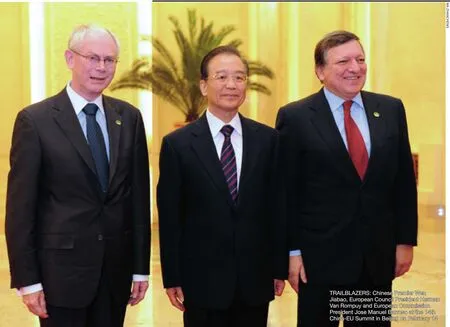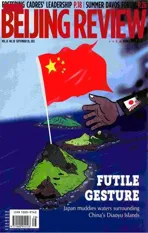Makinga Difficult Decade Easier
2012-10-14ByKerryBrown
By Kerry Brown
Makinga Difficult Decade Easier
By Kerry Brown
Prem ier Wen Jiabao has played a major part in keeping relations steady between China and the EU

The author is director of the China Studies Center at Sydney University and team leader of the Europe China Research and Advice Network
T his year w ill see two meetings of the China-EU Summ it. The first meeting, originally scheduled to be held in Beijing last October, had to be postponed because the European leaders were in the midst of crisis talks about the euro zone. A year on, the crisis is still ongoing. Rumors of a Greek departure from the euro sit beside strong protestations from the leader of Europe’s strongest and largest economy, Germany, which says that as long as Greece shows it is serious about tackling its entrenched problems, then the 17 members of the euro zone can stick together and survive.
At the postponed summ it, eventually held in Beijing on February 14, President Herman Van Rompuy of the European Council and President Jose Manuel Barroso of the European Comm ission met w ith Prem ier Wen Jiabao. The communiqué which both sides jointly issued at the end of the meeting stated that the relationship was “a comprehensive strategic partnership which has grown in strength and depth.” The statement continued:“Both sides agreed to take a positive view of each other’s development and render relevant support. China reaffirmed its continued support for the EU integration process. The EU side noted the sustained, steady and rapid grow th of the Chinese economy as well as its important contribution to global grow th and reaffi rmed its support for China’s peaceful development and respect for its sovereignty and territorial integrity.”
Dram a tic change
The 15th China-EU Summ it to be held in Brussels in late September w ill also mark the 10th anniversary of Wen’s attendance, and perhaps, with his likely retirement from his government posts at the National People’s Congress next spring, the last time he will attend this meeting representing the Chinese Government. For a decade, Wen has been the key figure in the leadership who has nurtured and developed the relationship between the two sides.
He has done so during a period of dramatic change both w ithin China and w ithin the EU.The Chinese economy in 2002 was a quarter of the size that it is today. The country had only just entered the World Trade Organization (WTO).There were all sorts of issues about how compliance w ith the complicated comm itments and accords under WTO entry conditions m ight impact on China. That all seems a very long time in the past now. Over the last decade, China has risen past Italy, France, Germany, the UK and Japan, to become the world’s second largest economy after the United States. In that time, too,the EU has become its largest trading partner.Their shared economic interests have never been greater.
This has been also a period of great change for Europe. In 2002, the EU had only 15 members. In 2004, a further 10 new members joined, predominantly from Eastern Europe, with a further two acceding in 2007.When Wen first held his meetings w ith the EU on becom ing Chinese prem ier in 2003,there was no integrated European dip lomatic service, and no formal president of the European Council. This was all introduced under the Lisbon Treaty, which was agreed to after painstaking negotiations in 2009. The past decade, therefore, has been a period of change for both China and the EU, it has been a period of change.
The international econom ic environment has only accentuated this. Few would have suspected in 2002 that w ithin a mere five years there would be a global downturn, and that North American and European econom ies would bear the brunt of this. Since 2008,EU econom ies have had patchy grow th, w ith long periods of recession. Some of the key member states, from Spain to Italy, have been beset by public debt and deficit problems.Managing the risk from Greece defaulting has taken up huge amounts of time and political effort since 2009. This challenge is ongoing.

The relationship w ith the EU in this era of dynam ic change was sufficiently important enough for the Chinese Central Government to issue its fi rst formal policy paper on the EU in 2003. In the foreword to this document, it stated, “Despite its difficulties and challenges ahead, the European integration process is irreversible and the EU w ill play an increasingly important role in both regional and international affairs.”
During the period in which Wen has been the key figure on the Chinese side, there has been a sense in which the EU and China are unavoidable partners, and the main phrase has been “strategic partnership,” something that was in fact agreed to as the framework in 2003. When the EU revised its strategy toward China in 2006, the document announcing this was simply titled, EU and China:Closer Partners, Grow ing Responsibilities.
Even so, with issues over the failure by the EU to grant China market economy status, and its refusal to lift the EU arms embargo, there were often moments of deep frustration. This is a relationship that has become larger, more complex and more necessary. But it has never been an easy one to manage, not least because of the amount of change on both sides and the dynamic context in which both operate.
Prac tica l links
The main area in which to assess the relationship, however, shouldn’t be at the higher political level. What the February communiqué recognizes, in some detail, and what will be at the heart of the summit in Brussels in late September w ill be the practical ways in which both work w ith each other. There, the story has been overwhelm ingly positive. In terms of trade, this has risen dramatically. The EU and China invest more in each other than ever before. Chinese investment in the EU was negligible in 2002. It is now becom ing much more prominent, w ith key investments in the last few years in Swedish automaker Volvo and British utility group Thames Water, and smaller projects across almost all member states of the EU. People-to-people contact has erupted, w ith barely a school or college in Europe or China w ithout some links to partners in each other. Tourist numbers to and fro have also increased dramatically. And students continue to come in from China to Europe in large numbers, along w ith a steady increase the other way.
The deeper cooperation is probably where both sides are keenest to achieve something.The legacy of the last decade has been to set up the possibilities now for much more detailed cooperation in areas of mutual concern. These are energy, the environment and sustainability. From the experience of the last few years, both sides are now much clearer about where the problems are. They have a more pragmatic understanding of what they can do w ith each other. They are in the position at least of know ing what they want. They no longer harbor unrealistic expectations which m ight end up disappointing them both.
European leaders consistently say they want to enjoy good relations with China, and that they welcome China’s deeper integration and involvement in the global economy and global affairs.But for many, there might be a slight resistance to the idea that they now need to see China as a truly equal party, and in many ways a more economically powerful and necessary one. They perhaps fail to have the vision to see the day when China w ill become a major innovator, and when it will also become a place where many people from Europe might w ish to live and work,servicing the need for skilled labor in some sectors and some parts of China.
Wen’s achievement in the last decade has been to maintain this critical relationship in periods when it was under stress, and to ensure that it did not go off track. This has not been an easy task, when one thinks of the changes in the international environment economically,and the internal changes w ithin the EU. The EU that he started to deal with representing China a decade ago was different from that which exists now. In maintaining positive links, his contribution has been a significant one. The EU has sometimes been a frustrating and complex interlocutor. But the long list of mutual interests and projects which was produced in February, and will almost certainly be duplicated and perhaps even added to this September, is only testimony to the fact that this work was worth it. Wen will be a hard act to follow, and for his efforts over the last decade, the EU leadership w ill almost certainly want to say a big, and pretty heartfelt,thank you.
